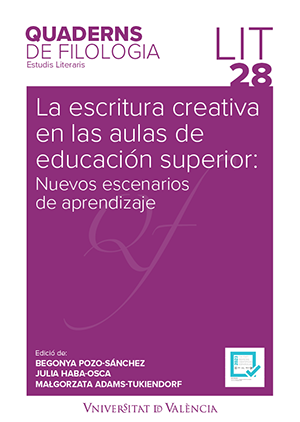Literature at the university. Lucid reading and creative writing towards an integrated linguistic-literary education
DOI:
https://doi.org/10.7203/qdfed.28.26538Keywords:
Linguistic and literary education, Complexity, Communicative competence, hermeneutics, integrated didactics. Abstract
Abstract
Reading and writing are irreplaceable activities for the formation of the citizen in a modern and democratic society, of free individuals who have a high level of self-knowledge. It is understood that the reduction of the linguistic and literary training of the population has been one of the most regressive features (because it is dehumanizing) of recent times. And conversely, his current incipient rehabilitation opens up prospects for positive work for those of us who detect the humanizing power of language.
This article supports the idea that there is no better way to teach writing than teaching reading, because writing and reading are reciprocal activities (Roca, 2021). Starting from this premise, a pedagogy of the literary text will be proposed based on the three phases of Ricoeur's (1980) hermeneutics: understand, explain and apply. The understanding of the (morpho)-logical structure, the explanation of the validity of the interpretation -and its discussion-, and the application, which refers to the ability to unite horizons and broaden them through dialogue, of an attitude that allows the work to manifest itself and invites the reader to creative writing (Galvan, 2004, Montilla-Narváez, 2021). This way of studying the literary work focused on the concept of application provides guidelines for a pluralism open to the essence of the works, encourages critical thinking and allows the emergence of improvement and transformation processes (Bain, 2006; Aguirre-Romero, 2019 ; Rock, 2021). The chapter will detail the vertices on which the didactic application of this theory is based (the theory of the complexity of communicative competence, problem-based learning and literary hermeneutics).
 Downloads
Downloads
Downloads
Published
How to Cite
-
Abstract328
-
PDF (Español)320
Issue
Section
License
 Este obra está bajo una licencia de Creative Commons Reconocimiento-NoComercial-SinObraDerivada 4.0 Internacional.
Este obra está bajo una licencia de Creative Commons Reconocimiento-NoComercial-SinObraDerivada 4.0 Internacional.
Authors who publish with this journal agree to the following terms:
- Authors retain copyright and grant the journal right of first publication with the work simultaneously licensed under a Creative Commons Attribution License that allows others to share the work with an acknowledgement of the work's authorship and initial publication in this journal.
- Authors are able to enter into separate, additional contractual arrangements for the non-exclusive distribution of the journal's published version of the work (e.g., post it to an institutional repository or publish it in a book), with an acknowledgement of its initial publication in this journal.
- Authors are permitted and encouraged to post their work online (e.g., in institutional repositories or on their website) prior to and during the submission process, as it can lead to productive exchanges, as well as earlier and greater citation of published work (See The Effect of Open Access).




